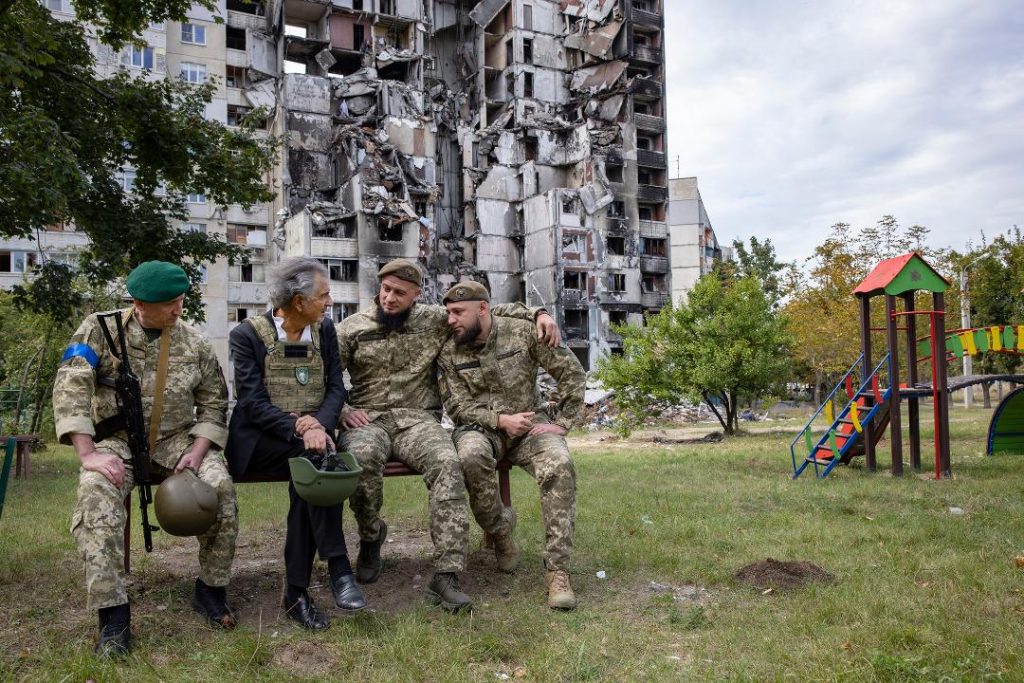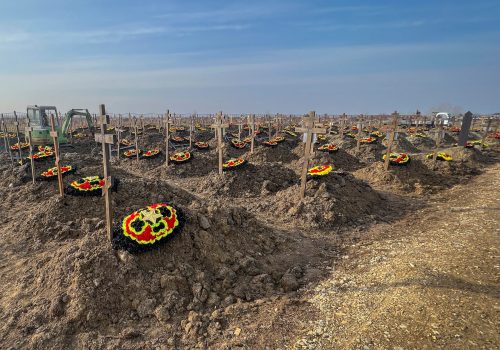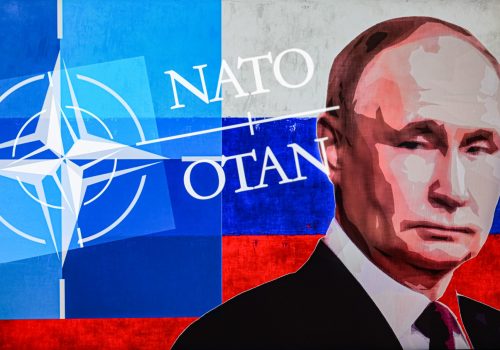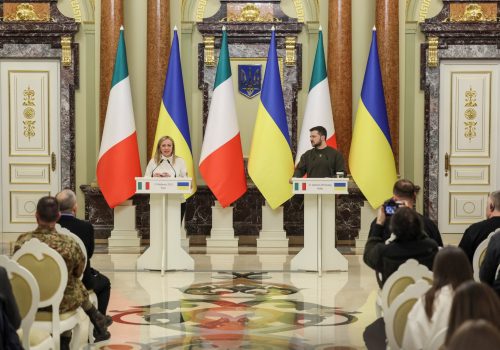For anyone seeking to make sense of Russia’s war in Ukraine, viewing French public intellectual Bernard Henri-Lévy’s new feature-length documentary “Slava Ukraini” (“Glory to Ukraine”) isn’t an option. It’s a must. A gritty, intense, and probing examination of the impact of the war, it offers what is surely the ultimate antidote to Ukraine fatigue.
As he pondered the course of the war, Henri-Lévy came to the conclusion that the best way to combat the West’s mounting impatience with the 15-month war and counter the push for preliminary negotiations was to show rather than tell. Instead of writing an essay, the 74-year-old French filmmaker and philosopher took to the road to illuminate the bravery of ordinary Ukrainians against what he calls the “master terrorist” in the Kremlin.
The film, which carefully traces Henri-Lévy’s journey across Ukraine, is about far more than jerky shots of the Frenchman and his crew dodging bullets and drone attacks. It is about Ukraine’s defiance of Putin’s attempt not simply to wage a war of territorial conquest, but to efface the idea of Ukrainian nationhood itself. “If I dare to give a certain logic to this crazy war, it is in the logic of the denial of Ukrainian identity,” he says. “This barbarity matches the logic of denying the very existence of Ukraine.”
Stay updated
As the world watches the Russian invasion of Ukraine unfold, UkraineAlert delivers the best Atlantic Council expert insight and analysis on Ukraine twice a week directly to your inbox.
As he journeys from Ukraine’s capital to the east, Henri-Lévy captures the dignity of the Ukrainian people through short vignettes that remain with you long after the credits roll. The Frenchman focuses on ordinary Ukrainians like the elderly woman who appears in the documentary engaged in the quotidian task of stirring a steaming pot of borscht and pleads for an end to the constant violence that has upended her life. She hopes to make it to her seventieth birthday, she says.
In Kyiv, after another Russian air strike hits a woman’s apartment, she apologizes profusely to Henri-Lévy for wearing a dirty black coat. Her kitchen is unusable after the bombing and her crockery is battered, but she’s more focused on the state of her appearance. She takes the French filmmaker to her makeshift bed, a chair inside a bathroom tub where she waited out the aerial assault, and smiles with pride at her ability to snatch a few hours of sleep.
Another scene captures everyday life for those who couldn’t leave cities and towns that Russia has pounded relentlessly in the east. A man who appears to be approaching pension age tries to chop wood with an axe, complaining that it’s warmer outside than inside.
Eurasia Center events

In Pavlograd, the French filmmaker dons a hard helmet and overalls to cover his black designer suit and spotless white shirt as he descends below ground to watch Ukrainian miners drill iron ore. The precious ore is eventually made into bullet-proof vests for soldiers at the front. After the steel miners are done for the day, they carry on packing care boxes of food and medicine for displaced families.
Henri-Lévy observes that every steelworker is a hero, just like the brave men and women on the front lines. In one of his characteristic meditative asides, he observes that the Greeks and Romans admired heroes in part because they were so rare. “In Ukraine, heroes are everywhere,” he says. The Frenchman confesses that he keeps coming back to Ukraine because it is rare in history to see so many people embody heroism in one place.
The documentary also features moments of exhilaration. Henri-Lévy captures joyous scenes from recently liberated Kherson, where hundreds mill in the main square, some searching for power to recharge their phones and tell their loved ones they are still alive. Perhaps the hardest and most powerful scene comes when Henri-Lévy visits a torture cell that still has fresh blood on the floor. The Russians never actually appear on film, but their depraved conduct casts a dark shadow over the documentary.
This film is anything but neutral and Henri-Lévy makes no attempt to disguise his sympathies. “I am partisan. I don’t give five minutes to the Jews and five minutes to the Nazis,” he says.
The Frenchman has consistently refused to engage in bogus moral hand-wringing when it comes to the Russian invasion of Ukraine. Instead, he is clear about which side he’s on, as viewers of “Slava Ukraini” will no doubt recognize. “I want the Ukrainians to win,” he commented on May 11 at a screening of the documentary at the E Street Cinema in Washington, DC.
Melinda Haring is director of stakeholder relations and social impact at the Superhumans Center. Jacob Heilbrunn is Editor of the National Interest. Haring and Heilbrunn are both non-resident senior fellows at the Atlantic Council’s Eurasia Center. “Slava Ukraini” was shown at a series of screenings in May organized with the Ukrainian American charity Razom. It can be viewed on Apple TV and YouTube.
Further reading
The views expressed in UkraineAlert are solely those of the authors and do not necessarily reflect the views of the Atlantic Council, its staff, or its supporters.

The Eurasia Center’s mission is to enhance transatlantic cooperation in promoting stability, democratic values and prosperity in Eurasia, from Eastern Europe and Turkey in the West to the Caucasus, Russia and Central Asia in the East.
Follow us on social media
and support our work
Image: A scene from Bernard Henri-Levy's new documentary "Slava Ukraini". (Photo credit: Marc Roussel)




